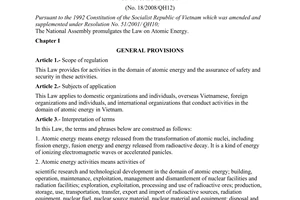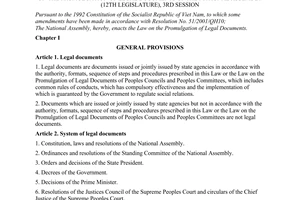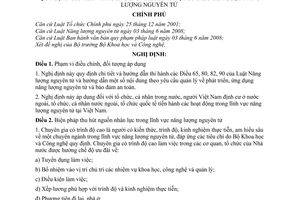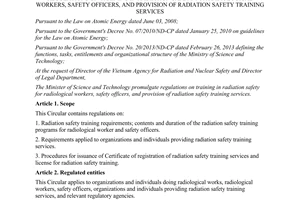Nội dung toàn văn Decree No. 07/2010/ND-CP, detailing and guiding a number of articles of the law on atomic energy
|
THE
GOVERNMENT |
SOCIALIST
REPUBLIC OF VIET NAM |
|
No. 07/2010/ND-CP |
Hanoi, January 25, 2010 |
DECREE
DETAILING AND GUIDING A NUMBER OF ARTICLES OF THE LAW ON ATOMIC ENERGY
THE GOVERNMENT
Pursuant to the December 25,
2001 Law on Organization of the Government;
Pursuant to the June 3, 2008 Law on Atomic Energy;
Pursuant to the June 3, 2008 Law on Promulgation of Legal Documents;
At the proposal of the Minister of Science and Technology,
DECREES:
Article 1. Scope of regulation and subjects of application
1. This Decree details and guides the implementation of Articles 65, 80, 82 and 90 of the Law of Atomic Energy and guides a number of relevant provisions to meet requirements of management of atomic energy development and use and safety assurance.
2. This Decree applies to domestic organizations and individuals, overseas Vietnamese, foreign organizations and individuals and international organizations that conduct activities in the domain of atomic energy in Vietnam.
Article 2. Measures to attract human resources in the domain of atomic energy
1. Senior experts are those who have deep knowledge about, high expertise and practical experience in a certain specialized field of atomic energy and satisfy the criteria set by the Ministry of Science and Technology. Senior experts working in state agencies and institutions may enjoy preferences and incentives in:
a/ Recruitment and employment;
b/ Appointment to posts in charge of scientific and technological tasks or managerial posts;
c/ Favorable working conditions;
d/ Salaries suitable to their expertise and practical experience;
e/ Travel and accommodations;
f/ Participation in scientific exchange and international cooperation;
g/ Other preferences and incentives.
2. Workers in the domain of atomic energy who are salaried by the state budget may enjoy a preferential occupational allowance equal up to 70% of their rank or grade salaries.
3. Graduates with very good or higher academic results in atomic energy specialties will be prioritized in the recruitment and employment by atomic energy state management agencies, training establishments or research and application institutions. The Ministry of Home Affairs shall specify the implementation of this provision.
4. University and graduate students in atomic energy specialties may have their tuitions paid by the State and be granted scholarships, for those studying at home, and be provided with tuition supports, for those studying abroad. The Ministry of Education and Training shall assume the prime responsibility for, and coordinate with the Ministry of Science and Technology in, specifying the implementation of this provision.
5. The Ministry of Home Affairs shall assume the prime responsibility for, and coordinate with the Ministry of Science and Technology, the Ministry of Finance and the Ministry of Labor, War Invalids and Social Affairs in, devising particular measures to attract human resources as specified in Clauses 1 and 2 of this Article before proposing them to the Prime Minister for decision.
Article 3. Measurement of radiation, inspection and correction of radiation recording-measuring, radiation and nuclear devices
1. Organizations and individuals that use devices on the list of radiation recording-measuring, radiation and nuclear devices subject to inspection and correction shall inspect and correct such devices in the following cases: a/ Before putting such devices into use; b/ On a periodical basis; c/After reinstalling or repairing such devices, which may affect their safety and precision.
2. The Ministry of Science and Technology shall establish and maintain national standards of radiation measurement; and promulgate specific regulations on inspection and correction and a list of radiation recording-measuring, radiation and nuclear devices subject to inspection and correction.
Article 4. Environmental radioactivity observation and warning
1. The national network of environmental radioactivity observation and warning is a specialized radioactivity observation network within the national system of natural resources and environment observation.
2. The national network of environmental radioactivity observation and warning shall coordinate with the national system of natural resources and environment observation in serving the assessment of the actual state of environmental radioactivity and irradiation dose for population communities; setting up a database on environmental radioactivity; and monitoring and warning all radiation anomalies in the Vietnamese territory.
3. The Ministry of Science and Technology shall work out and submit to the Prime Minister for approval a planning on the national network of environmental radioactivity observation and warning, and its functions and tasks and the mechanism for its coordination within the national system of natural resources and environment observation; and establish and manage the national network of environmental radioactivity observation and warning after its planning is approved by the Prime Minister.
Article 5. Assurance of safe working conditions for radiation workers
Heads of organizations and individuals licensed to perform radiation jobs shall assure safe working conditions for their radiation workers as follows:
1. Furnishing protection equipment, radiation recording-measuring devices and personal radiation dose meters for radiation workers when performing radiation jobs.
2. Organizing training courses for newly recruited radiation workers and providing radiation workers with annual drills and new knowledge about radiation safety and professional knowledge.
3. Organizing health checks for newly recruited radiation workers; organizing annual health checks for radiation workers under regulations of the Ministry of Health.
4. Organizing the assessment of personal irradiation dose for radiation workers at least once every quarter.
5. When a radiation worker is exposed to an irradiation dose exceeding the prescribed limit, the concerned organization or individual licensed to perform radiation jobs shall immediately:
a/ Introduce him/her to a specialized medical establishment for health check and monitoring;
b/ Identify cause(s) of excessive irradiation and devise remedies;
c/ Place him/her in a more suitable job.
6. Complying with regulations on labor safety and sanitation.
The Ministry of Science and Technology shall detail the provisions of Clauses 1, 2, 3 and 4 of this Article.
Article 6. Finding of radioactive sources and nuclear materials or devices which are lost, misappropriated, abandoned or illegally transferred or unreported
1. Upon finding or obtaining information on radioactive sources or nuclear materials or devices which are lost, misappropriated, abandoned, illegally transferred or unreported (below referred to as uncontrolled radioactive sources, nuclear materials or devices), organizations and individuals shall promptly report the finding to the nearest People's Committee or police office or provincial-level Science and Technology Department.
2. Border-gate customs offices shall have technical equipment and take necessary measures to detect radioactive sources and nuclear materials at their border gates.
3. Establishments using discarded iron and steel for metallurgical purpose shall take measures or procure equipment to detect radioactive sources and nuclear materials.
4. The Ministry of Science and Technology shall assume the prime responsibility for, and coordinate with concerned ministries and branches in, guiding and organizing the application of measures to detect uncontrolled radioactive sources and nuclear materials and devices.
Article 7. Responsibilities of agencies in the course of finding and handling uncontrolled radioactive sources and nuclear materials and devices
1. People's Committees or police offices that receive information on uncontrolled radioactive sources or nuclear materials and devices shall promptly notify such to provincial-level Science and Technology Departments.
2. A provincial-level Science and Technology Department shall:
a/ Upon receiving information on an uncontrolled radioactive source or nuclear material or device, coordinate with the provincial-level Police Department and concerned agencies in verifying information and carrying out a search:
b/ Upon finding an uncontrolled radioactive source or nuclear material or device, guide concerned organizations and individuals in taking safety and security assurance measures;
c/ Notify the information to the Radiation and Nuclear Safety Department for coordination in searching, handling and reporting to the provincial-level People's Committees on the process of finding and handling.
3. A provincial-level Police Department shall:
a/ Assume the prime responsibility for, and coordinate with the Radiation and Nuclear Safety Department, provincial-level Science and Technology Department and concerned agencies, organizations and individuals in, verifying information, taking part in the search and taking order and security assurance measures;
b/ Coordinate with the Radiation and Nuclear Safety Department, provincial-level Science and Technology Department and concerned agencies, organizations and individuals in, investigating and identifying radioactive source, nuclear material or device owners, managers or users for handling under law.
4. The Radiation and Nuclear Safety Department shall:
a/ Upon receiving information on an uncontrolled radioactive source, nuclear material or device, provide professional guidance and technical assistance for the provincial-level Police Department or Science and Technology Department to verify information and carry out a search;
b/ Assume the prime responsibility for. and coordinate with concerned agencies, organizations and individuals in. applying measures to handle the uncontrolled radioactive source or nuclear material or device found;
c/ Report to the Minister of Science and Technology on the finding and handling.
5. The Ministry of Science and Technology shall:
a/ Assume the prime responsibility for. and coordinate with ministries and branches in. guiding and organizing the application of measures to search and handle uncontrolled radioactive sources and nuclear materials and devices;
b/ Build and put into operation facilities for storing uncontrolled radioactive sources and nuclear materials and devices;
c/ Report to the Prime Minister on the finding and handling in serious cases.
Article 8. Funds for finding, searching, handling and storing uncontrolled radioactive sources and nuclear materials and devices
1. The state budget shall allocate funds for border-gate customs offices, the Radiation and Nuclear Safety Departments, provincial-level Science and Technology DepartmentSX, and state organizations with the function of technical assistance to find, search, handle and store uncontrolled radioactive sources and nuclear materials and devices, including:
a/ Allocations for procuring equipment and building facilities for storing uncontrolled radioactive sources and nuclear materials and devices;
b/ Funds for searching, handling and storing uncontrolled radioactive sources and nuclear materials and devices.
The Ministry of Finance shall assume the prime responsibility for, and coordinate with the Ministry of Science and Technology in, specifically guiding allocations and funds specified in this Clause.
2. In case organizations and individuals that own or store radioactive sources, nuclear materials and devices which are misappropriated, lost, abandoned or illegally transferred can be identified, they shall refund the whole fund for the search, handling and storage of these radioactive sources and nuclear materials and devices under Point b, Clause 1 of this Article.
Article 9. Safety control of radioactive materials in transit and operation of seagoing ships and other vessels that are nuclear-powered
1. Transit of radioactive materials via the Vietnamese territory and operation of seagoing ships and other vessels that are nuclear-powered in the Vietnamese territory are subject to permission of the Ministry of Science and Technology after obtaining the Prime Minister's written approval.
If refusing to grant such permits, the Ministry of Science and Technology shall notify in writing applicants thereof.
2. Organizations and individuals mentioned in Clause 1 of this Article shall submit their dossiers of application for licenses to perform radiation jobs under regulations of the Ministry of Science and Technology.
3. The Radiation and Nuclear Safety Department and concerned agencies shall watch the transit of radioactive materials via the Vietnamese territory and operation of seagoing ships and other vessels that are nuclear-powered in the Vietnamese territory.
4. The Ministry of Science and Technology shall guide in detail the safety control of the transit of radioactive materials via the Vietnamese territory and operation of seagoing ships and other vessels that are nuclear-powered in the Vietnamese territory.
Article 10. Mechanism for coordination between customs offices and concerned agencies in controlling import and export of radioactive materials and nuclear devices through border gates
1. A border-gate customs office shall:
a/ Prioritize customs clearance for radioactive materials and nuclear devices which fully satisfy conditions of packing, transportation, import or export permit, and update information on these materials and in the database on radioactive materials and nuclear devices under regulations of the Ministry of Science and Technology;
b/ In case radioactive materials and nuclear devices fail to fully satisfy the conditions specified at Point a, Clause 1 of this Article, seize them, make a written record on the seizure and apply safety and security measures under regulations and promptly report such to the Ministry of Science and Technology through the Radiation and Nuclear Safety Department for coordinated handling;
c/ In case of occurrence of a radiation incident or a nuclear incident stemming from radioactive materials or nuclear equipment at the border gate, take response measures already planned under regulations of the Ministry of Science and Technology and promptly report the incident to the local provincial-level People's Committee and the Radiation and Nuclear Safety Department for coordinated handling;
d/ Send annual reports on the import or export of radioactive materials and nuclear devices to the Ministry of Science and Technology for summarization and reporting to the Prime Minister.
2. The Radiation and Nuclear Safety Department shall:
a/ Provide professional guidance and technical assistance for border-gate customs offices to control the import and export of radioactive materials and nuclear devices;
b/ Assume the prime responsibility for, and coordinate with provincial-level Science and Technology Departments and concerned agencies in, promptly taking handling measures under regulations after receiving reports mentioned at Points b and c. Clause 1 of this Article.
3. Provincial-level Science and Technology Departments shall assist provincial-level People's Committees in:
a/ Coordinating with border-gate customs offices in the inspection and handling to ensure radiation and nuclear safety in case radioactive materials and nuclear devices fail to satisfy the customs clearance conditions specified at Point b. Clause 1 of this Article;
b/ Coordinating with the Radiation and Nuclear Safety Department in handling radiation incidents and nuclear incidents stemming from radioactive materials and nuclear devices at border gates.
4. Other agencies at border gates shall, within their functions and tasks, assist and coordinate with border-gate customs offices in the cases specified at Points b and c. Clause 1 of this Article.
Article 11. Determination of levels of incidents and notification thereof in the mass media
1. Levels of incidents to be notified in the mass media upon their occurrence are determined as follows:
a/ Level-1 incident means an event in which internal working regulations are breached or any device fails but the multi-layer protection system is still secured;
b/ Level-2 incident means an event in which safety rules are breached or any protection equipment is damaged but the protection system is not affected; a radiation worker(s) is(are) exposed to a dose exceeding the occupational dose limit by ten times or less; the radiation dose ratio at the working place exceeds 50 millisieverts per hour (mSv/h) or there is a radioactive contamination that needs to be remedied in places designed to be free from contamination under normal conditions;
c/ Level-3 incident means an incident in which the protection system is damaged resulting in a leakage of radioactive substances causing contamination in places designed to be free from contamination under normal conditions and irradiation of local inhabitants at a level not exceeding the public dose limit; a radiation worker(s) is(are) exposed to a dose exceeding the occupational dose limit by more than ten times or the radiation dose ratio in the working place exceeds 1 sievert per hour (Sv/h);
d/ Level-4 incident means an accident in which a fuel bar of a nuclear reactor melts or is damaged resulting in a release of over 0.1% of total radioactive substances from the active zone. For other nuclear facilities, an incident of this level means an accident resulting in an external release of a considerable amount of radioactive substances, irradiation of radiation worker(s) at a fatal level, or irradiation of local inhabitants at a level not exceeding the public dose limit;
e/ Level-5 incident means an accident in which the active zone of a nuclear reactor is damaged. For other nuclear facilities, an incident of this level means an accident resulting in an external release of a considerable amount of radioactive substances or irradiation of a radiation worker(s) at a fatal level; or causing health and environmental effects outside the facility, and making it necessary to take some of the countermeasures outside the facility;
f/ Level-6 incident means a serious accident in a nuclear reactor resulting in an external release of an amount of radioactive substances equivalent to thousands or tens of thousands terabecquerels (TBq) of Iodine-131. For other nuclear facilities, an incident of this level means a serious accident resulting in an external release of a considerable amount of radioactive substances, causing many deaths and requiring the implementation of all countermeasures provided in a provincial-level incident response plan;
g/ Level-7 incident means a nuclear disaster caused by explosion of a nuclear reactor, resulting in an external release of a very large amount of radioactive substances on a wide scale and requiring the implementation of a national incident response plan.
2. Upon occurrence of an incident, the Ministry of Science and Technology shall assume the prime responsibility for, and coordinate with concerned ministries and ministerial-level agencies in, determining the level of the incident and notify it in the mass media on:
a/ Radioactivity level at the place of occurrence, forecast the incident's developments and impacts on the community and the environment;
b/ Acts and measures to protect the community health.
Article 12. Charges and fees
1. Charges to be levied in the domain of atomic energy include:
a/ Charge for safety and security assessment before grant of licenses to perform radiation jobs;
b/ Charge for appraisal of eligibility before grant of registration certificates of atomic energy application support services;
c/ Charge for appraisal of eligibility before grant of practice certificates to providers of atomic energy application support services;
d/ Charges for services provided in the domain of atomic energy.
2. Fees to be levied in the domain of atomic energy include:
a/ Fee for grant of licenses to perform radiation jobs;
b/ Fee for grant of registration certificates of atomic energy application support services;
c/ Fee for grant of practice certificates to providers of atomic energy application support services;
d/ Fee for grant of radiation worker certificates.
3. The Ministry of Finance shall assume the prime responsibility for, and coordinate with the Ministry of Science and Technology in, specifying rates and the regime of collection, remittance, management and use of charges and fees specified in Clauses 1 and 2 of this Article.
Article 13. Occupational insurance, civil liability insurance and environmental damage compensation liability insurance
1. Occupational insurance, civil liability insurance and environmental damage compensation liability insurance specified in Clause 1, Article 90 of the Law on Atomic Energy are compulsory.
2. Organizations and individuals licensed to perform the following radiation jobs shall purchase environmental damage compensation liability insurance:
a/ Operation of a research nuclear reactor or a nuclear power plant;
b/ Production or processing of radioactive substances;
c/ Exploitation and processing of radioactive ores;
d/ Disposal of radioactive wastes and spent radioactive sources and nuclear materials.
3. Insurance businesses licensed to provide compulsory insurance may not refuse to sell the insurances specified in Clauses 1 and 2 of this Article.
4. The Ministry of Finance shall promulgate insurance rules, terms, premium levels and the minimum insurance sum applicable to each type of insurance specified in Clauses 1 and 2 of this Article. Insurance premium levels shall be set based on the possibility of damage to be caused by radiation jobs.
Article 14. Transitional provisions
1. Licenses granted by competent state management agencies to radiation facilities and workers before the effective date of this Decree remain valid until their validity duration expires.
2. Dossiers of application for licenses of radiation facilities and workers already filed with competent state management agencies and remaining unsettled before the effective date of this Decree must be updated and supplemented under the Law on Atomic Energy.
Article 15. Effect
This Decree takes effect on March 15, 2010.
Article 16. Implementation responsibility
1. The Minister of Science and Technology shall organize the implementation of this Decree.
2. Ministers, heads of ministerial-level agencies, heads of government-attached agencies, chairpersons of provincial-level People's Committees and concerned organizations and individuals shall implement this Decree-
|
|
ON
BEHALF OF THE GOVERNMENT |






